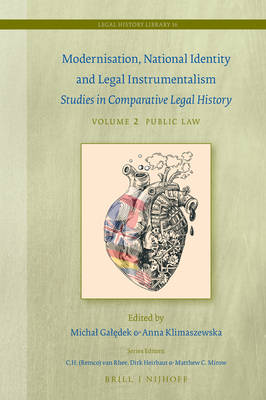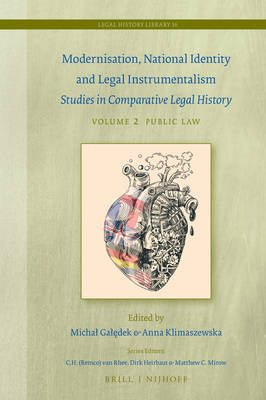
Je cadeautjes zeker op tijd in huis hebben voor de feestdagen? Kom langs in onze winkels en vind het perfecte geschenk!
- Afhalen na 1 uur in een winkel met voorraad
- Gratis thuislevering in België vanaf € 30
- Ruim aanbod met 7 miljoen producten
Je cadeautjes zeker op tijd in huis hebben voor de feestdagen? Kom langs in onze winkels en vind het perfecte geschenk!
- Afhalen na 1 uur in een winkel met voorraad
- Gratis thuislevering in België vanaf € 30
- Ruim aanbod met 7 miljoen producten
Zoeken
Modernisation, National Identity and Legal Instrumentalism (Vol. II: Public Law)
Studies in Comparative Legal History
€ 187,45
+ 374 punten
Omschrijving
The driving force of the dynamic development of world legal history in the past few centuries, with the dominance of the West, was clearly the demands of modernisation - transforming existing reality into what is seen as modern. The need for modernisation, determining the development of modern law, however, clashed with the need to preserve cultural identity rooted in national traditions. With selected examples of different legal institutions, countries and periods, the authors of the essays in the two volumes Modernisation, National Identity and Legal Instrumentalism: Studies in Comparative Legal History, vol. I: Private Law and Modernisation, National Identity and Legal Instrumentalism: Studies in Comparative Legal History, vol. II: Public Law seek to explain the nature of this problem.
Contributors are Judit Beke-Martos, Jiří Brňovják, Marjorie Carvalho de Souza, Michal Galędek, Imre Képessy, Ivan Kosnica, Simon Lavis, Maja Maciejewska-Szalas, Tadeusz Maciejewski, Thomas Mohr, Balázs Pálvölgyi, and Marek Starý.
Contributors are Judit Beke-Martos, Jiří Brňovják, Marjorie Carvalho de Souza, Michal Galędek, Imre Képessy, Ivan Kosnica, Simon Lavis, Maja Maciejewska-Szalas, Tadeusz Maciejewski, Thomas Mohr, Balázs Pálvölgyi, and Marek Starý.
Specificaties
Betrokkenen
- Uitgeverij:
Inhoud
- Aantal bladzijden:
- 240
- Taal:
- Engels
- Reeks:
- Reeksnummer:
- nr. 36
Eigenschappen
- Productcode (EAN):
- 9789004417151
- Verschijningsdatum:
- 19/12/2019
- Uitvoering:
- Hardcover
- Formaat:
- Genaaid
- Afmetingen:
- 160 mm x 236 mm
- Gewicht:
- 476 g

Alleen bij Standaard Boekhandel
+ 374 punten op je klantenkaart van Standaard Boekhandel
Beoordelingen
We publiceren alleen reviews die voldoen aan de voorwaarden voor reviews. Bekijk onze voorwaarden voor reviews.








